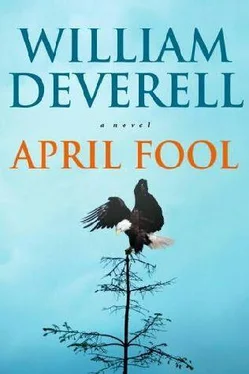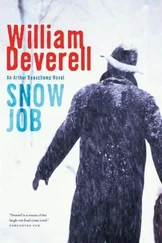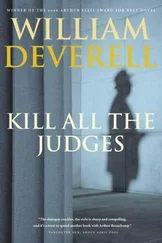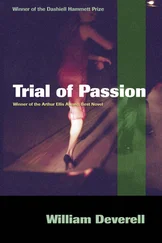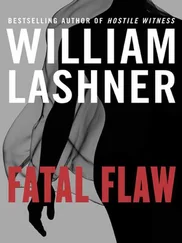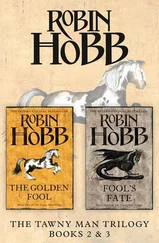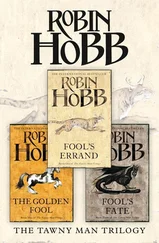William Deverell - April Fool
Здесь есть возможность читать онлайн «William Deverell - April Fool» весь текст электронной книги совершенно бесплатно (целиком полную версию без сокращений). В некоторых случаях можно слушать аудио, скачать через торрент в формате fb2 и присутствует краткое содержание. Год выпуска: 2005, ISBN: 2005, Издательство: McClelland & Stewart, Жанр: Криминальный детектив, на английском языке. Описание произведения, (предисловие) а так же отзывы посетителей доступны на портале библиотеки ЛибКат.
- Название:April Fool
- Автор:
- Издательство:McClelland & Stewart
- Жанр:
- Год:2005
- ISBN:9780771027116
- Рейтинг книги:3 / 5. Голосов: 1
-
Избранное:Добавить в избранное
- Отзывы:
-
Ваша оценка:
- 60
- 1
- 2
- 3
- 4
- 5
April Fool: краткое содержание, описание и аннотация
Предлагаем к чтению аннотацию, описание, краткое содержание или предисловие (зависит от того, что написал сам автор книги «April Fool»). Если вы не нашли необходимую информацию о книге — напишите в комментариях, мы постараемся отыскать её.
April Fool — читать онлайн бесплатно полную книгу (весь текст) целиком
Ниже представлен текст книги, разбитый по страницам. Система сохранения места последней прочитанной страницы, позволяет с удобством читать онлайн бесплатно книгу «April Fool», без необходимости каждый раз заново искать на чём Вы остановились. Поставьте закладку, и сможете в любой момент перейти на страницу, на которой закончили чтение.
Интервал:
Закладка:
Arthur feels winded but in no distress as he climbs from sheep pastures into dense cedar forest, to a mossy mesa with thick-waisted Douglas firs, a swirling ballet of green-leafed arbutus, groves of Garry oaks, twisted and fat of bud. Below, through gaps, can be seen the rocky beach and the strait, and beyond, the perilously close shores of vast, busy Vancouver Island.
As he nears the Garlinc property-ill-protected by rusting fence wire-he hears a distant hammering, and wonders if a crew is already working on the road access. The valley is guarded on either side by high rock faces, and the only opening, known as Gwendolyn Gap, or just the Gap, is too narrow for a road. But the developers have been given a blasting permit. Arthur shudders, recoils from the ugliness of it, of man and his machines and his explosive devices.
He exerts himself over one last rise, takes in a soul-shuddering view of valley, sea, and distant snow-coned mountains, and realizes he has forgotten to buy lemons. What causes this Lethean forgetfulness? Maybe it’s the bizarre murder charge against Nick Faloon, churning darkly in his mind.
He sits on the grass against a boulder, a cautious twenty feet from the lip of the precipice above the Gap. He pulls out the newspaper and his glasses and his old Peterson bent, and as he stuffs it with tobacco, he looks down upon Gwendolyn Pond at the buffleheads and mallards gliding among the water lilies. He is overcome by a feeling of helplessness.
Living in the country, living with Margaret, has connected him with the earth in ways that remain elusive, made him aware that an ancient, more beautiful time is gone. Forever, he fears. He can’t see the Save Gwendolyn Society preserving even this tiny speck of the planet.
“Don’t get yourself tangled in politics on this crazy island, Beauchamp,” Doc Dooley counselled. “It’s an invitation to the grave.”
Arthur lights up, reads a precis of events in a sleepy outport four days ago-dubbed by the press the April Fool’s Day murder. Several sports fishers robbed, Dr. Winters raped, choked to death on her own underwear. He had heard nothing on the radio, but it is regularly tuned to classical music. He won’t have a television set.
The victim of this slaying is “a well-known psychologist and relationship therapist” whom he vaguely remembers smiling at him from the newspapers, a syndicated column, Doctor Eve . Indeed, he admits to having furtively read her advice. She was no pseudo-expert in the manner of Ann Landers, held a Ph.D. in counselling psychology.
“Nicholas Faloon, 54, proprietor of a local inn, was arrested while attempting to flee the area dressed as a woman.” This seems a Faloonish touch. He insisted, on being arraigned, that his name was Gertrude Heeredam, and demanded a Dutch interpreter. Thus the psychiatric assessment.
It is inconceivable that Faloon will pull this off. Has he not got a lawyer? Arthur wonders if he should urge a friend to take on his case, someone competent, experienced.
He looks away from the newspaper, listens again to the sound of hammering. Probably a woodpecker. Clouds, wet and gloomy, are rolling in. A kingfisher chatters by the pond. Two bald eagles make lazy loops above him, then one sails toward a perch on a Douglas fir. He makes out a clump of twigs there: an old nest.
He returns to his newspaper. “Sources say Faloon is known to the police.” That seems an understatement. Faloon is a kleptomaniac who, in brave acceptance of his disability, put his compulsion to profitable use from an early age. Arthur first acted for him in a juvenile case involving a missing box of rare comic books.
Faloon’s last trial, the rape, still causes acid to burn in Arthur’s gut, the low point of his courtroom career, the only wrongful conviction to besmirch his forty-year record. Ten years for a sexual assault Faloon did not commit. Arthur invariably rejected consent rape defences, the defendant often a brute, the woman twice victimized. But this mild-mannered thief would be as likely to attack a woman as a pumpkin to sprout wings and fly.
Arthur still takes on the burden of the failed defence, excoriates himself. He didn’t penetrate the armour of the complainant, Adeline Angella, an attention-seeking magazine writer who tearfully described to a jury how an interview with a celebrated jewel thief evolved into a rape extorted by a knife to her throat.
Angella sent out a plea to Women Against Violence to fill the court. Who in that hostile arena was going to believe that Nick Faloon succumbed to Angella’s lure? Arthur wasn’t able to put a firm finger on her motive for making a false complaint. Publicity? Profit? After the trial and appeal, her blunt account of her courtroom ordeal appeared in a major women’s monthly.
The article in the Sun quotes Staff Sergeant Jasper Flynn: “The theory we’re working on is the victim met her fate after resisting an intruder intent on robbing her.” “Met her fate”-a shy euphemism from a veteran cop. He declined to say whether anything was stolen from her. How absurd to think Faloon would engineer a lucrative robbery of hotel rooms, then compromise his success by targeting, in the dead of night, a visiting psychologist. But that seems the official view.
Surely, he’s again a victim of circumstances, of coincidence, a man in the wrong place at the worst of possible times, an obvious target. The police zeroed in on him, ignoring other possibilities. An act of rape is alleged, so there is likely to be DNA from the attacker’s semen-the test results surely will exonerate poor Nick.
The last time they met was after Faloon was given day parole. He came to Arthur’s office bearing a gift, a box of Cuban cigars, which Arthur accepted guiltily, not wanting to offend the man he’d failed so grievously.
“Did I not hear you tell the parole board you’ve mended your ways?” he asked.
“Almost, Mr. Beauchamp. I’m just putting together a little poke, and then I’m certified street legal.”
Something in the tourist industry, he said. A bed-and-breakfast. Arthur had encouraged him, but held little hope.
It has begun to rain. The two eagles are in the air again: a display of aerobatics, cartwheels and swoops, one in pursuit of the other. Arthur is awed: this is their famed nuptial display-he can hardly wait to tell Margaret. After the eagles gambol away behind a hill, he folds his newspaper, packs away his pipe, rises, and casts a last look below. Gwendolyn Bay is on the other side of the island from Blunder Bay. He will not have to look at the damage they will do here.
He arrives home drenched. His apology draws from Margaret a look between disbelief and exasperation. “Jesus, Arthur, I don’t care about the damn lemons, I care about your health.” She’s fifteen years younger than Arthur, a feisty survivor of the 1960s-that’s when her commune set up shop on the island. It didn’t last; Margaret did.
This gracile, lithe, and energetic activist is leagues apart, in substance and style, from his first wife, Annabelle, chic and city-slick, artistic director of an opera company. She broke his heart, capping a series of affairs by absconding with a conductor. The sole child of that sad union, Deborah, a divorced single parent, is in Australia, a school principal. Arthur’s parents also went their separate ways. Leeches of incompatibility lurk in the mud of the Beauchamp gene pool.
Arthur worries that Margaret, in turn, may yet find a bad fit with a Beauchamp, will find it intolerable living with this forgetful soliloquizing bore. Pompous, donnish A.R. Beauchamp, a poor lover, frequently unavailable.
After he tells Margaret of the eagles’ conjugal dance, she rushes to the phone to call her friend Zoe, the local minister’s wife. “The eagles are mating!” Her bell-like voice, breathless and triumphant.
Читать дальшеИнтервал:
Закладка:
Похожие книги на «April Fool»
Представляем Вашему вниманию похожие книги на «April Fool» списком для выбора. Мы отобрали схожую по названию и смыслу литературу в надежде предоставить читателям больше вариантов отыскать новые, интересные, ещё непрочитанные произведения.
Обсуждение, отзывы о книге «April Fool» и просто собственные мнения читателей. Оставьте ваши комментарии, напишите, что Вы думаете о произведении, его смысле или главных героях. Укажите что конкретно понравилось, а что нет, и почему Вы так считаете.
